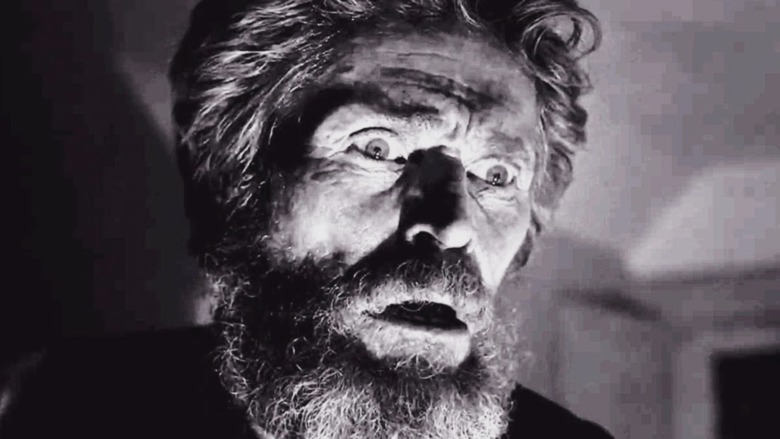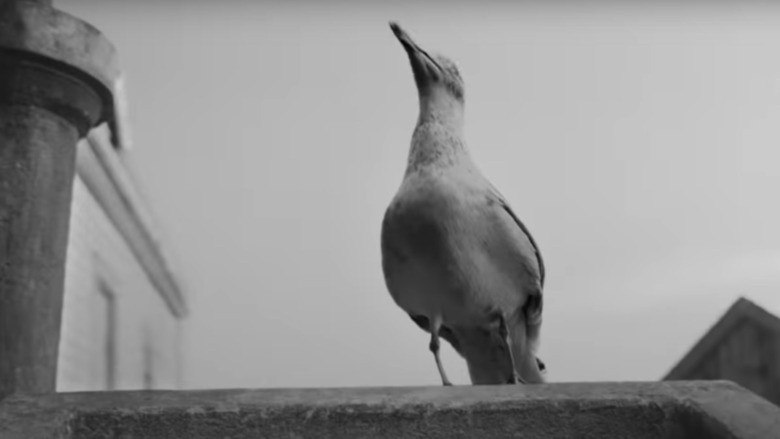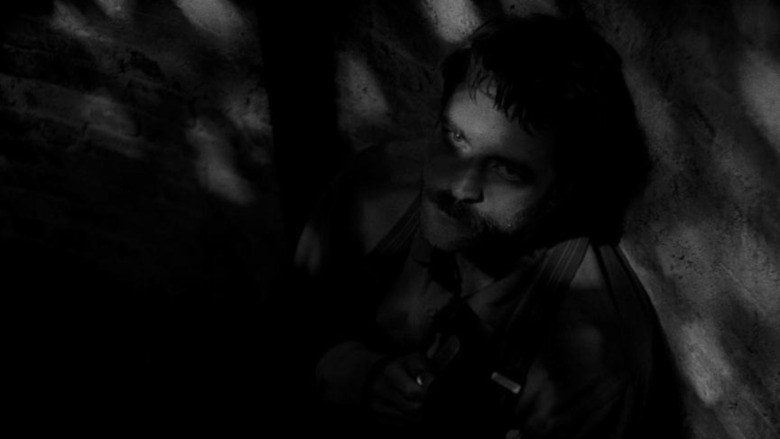The Ending Of The Lighthouse Explained
As he demonstrated with 2015's period horror "The Witch" — often stylized as "The VVitch" — Robert Eggers is a filmmaker who is fascinated with the intersection of history, myth, and superstitions. In that film, an isolated colonial family falls prey to dark magic that preys on their fears and insecurities, causing them to implode and face gruesome fates. While "The Witch" is fascinated with the supernatural, it's the psychological human horror that hits home the hardest.
Similarly, Eggers' follow-up, "The Lighthouse," toes the line between myth and madness, albeit in a new setting and time period. Then there's the added farting, homoeroticism, and cheeky time with mermaids. It's unclear what's real and imagined in "The Lighthouse," but the movie's hallucinatory qualities and lack of exposition provides some interesting food for thought, nonetheless.
"The Lighthouse" stars Willem Dafoe and Robert Pattinson as Thomas Wake and Ephraim Winslow, respectively. They're a pair of foul-mouthed 19th-century lighthouse keepers who spend their days getting drunk and gradually succumbing to anger, madness, and paranoia, leading toward a violent climax that will make you think twice about upsetting seagulls the next time you visit the beach. Throw on a tentacle monster and other surprises, and what you have is one bona fide nautical nightmare for the ages.
The Lighthouse's ending sees Ephraim pay for his mistakes
In one of the film's most memorable scenes, Ephraim grabs a seagull and viciously hammers the creature's body against a rocky surface — multiple times — until it's nothing but feathers and splatter residue. At the end of the film, a flock of seagulls appear and feast on his innards, which is a gross-out moment that recalls the nautical folk tales of old. As Den of Geek noted, Eggers turned to maritime lore while researching "The Lighthouse," and it informed much of the story. For a start, the film's bare-bones premise was inspired by a real-life murder case involving two Welsh lighthouse keepers in the early 19th century. Other aspects of the film were informed by sailor diaries, fiction, and paintings from the era.
The ending, however, is an example of a sailor's greatest fear come to life. In seafaring lore and superstition, seagulls are believed to possess the spirits of deceased sailors, and killing one of them is a bad omen that could spell dire consequences for the culprit. Therefore, the closing moments of "The Lighthouse" can be interpreted as the spirits avenging their fallen friend (just don't ask Robert Pattinson what it all means).
This isn't the only legend that's explored in the ending of "The Lighthouse," either.
The Lighthouse was inspired by Greek mythology
Ephraim isn't the type of guy who plays by the rules in "The Lighthouse," which is what leads to his demise. He's determined to learn all about the secrets that reside at the top of the structure, but Thomas refuses to tell him. Some knowledge needs to be kept top secret, and this is where the film's Greek mythological influences come into play.
Thomas and Ephraim are based on the Greek legends Proteus and Prometheus, two popular figures who didn't have much of a relationship prior to "The Lighthouse." But who are they? The former is an omniscient ocean god and a keeper of sacred knowledge, and much like Thomas refusing to tell Ephraim about the lighthouse's potentially monstrous mystery, Proteus had a tendency to never spill the beans about anything. Prometheus, on the other hand, was a trickster who climbed Mount Olympus and stole from the Greek gods. Naturally, this angered the deities, so Zeus had Prometheus chained to a rock and feasted on by an eagle. Ephraim's story contains many parallels to Prometheus', and that was always the intention on the writer-director's part.
Proteus and Prometheus never crossed paths in Greek legend, but Eggers combined their stories in "The Lighthouse" to great effect. In an interview with Vox, he explained that he wanted the characters to hang out together, especially since the "classical authors" he admires had a tendency to create mythological pastiches in their own stories.


